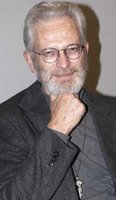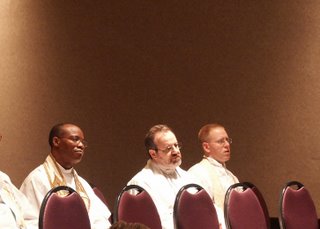
I attended the Breakfast with Cardinal Arinze at the Andiamo Ristorante in Warren, Michigan this morning. The Cardinal was in rare form, with the usual sharpness and wit on the liturgy. There are definitely some quotable quotes. I had just gotten my camera out and turned it on, never realizing the Cardinal would walk right past my table. I got the pick off just before someone cut in front of the camera.
The event was MC'd by Teresa Tomeo of Catholic Connection - the morning show now carried by EWTN Radio. I wouldn't be suprised to see them rebroadcasting it, perhaps on the Henry Root show, which airs Sundays at 3:00.

There were many guests at the table with Cardinal Arinze, including the few seen here (from left to right) Father Tad Pacholczyk, Director of Education at the NCBC who was the second speaker, Adam Cardinal Maida of Detroit, Teresa Tomeo at the podium, Francis Cardinal Arinze of the Congregation for Divine Worship (CDW), and, on the far right, Bishop Robert J. Carlson of Saginaw.
For those who did not have a paper and pen to write down his website, the home page for Fr. Tad, it is:
NCBCenter.org
If you ever lose it, you can find it in my sidebar under the Chastity, Purity, Morality, & Life section.
I'll add more posts on this after I've had a chance to go through my pics.
Check back with my home page in the coming days for additional photo posts of this event, with comments, and hopefully a few of those quotes.
Deo Gratias!


















